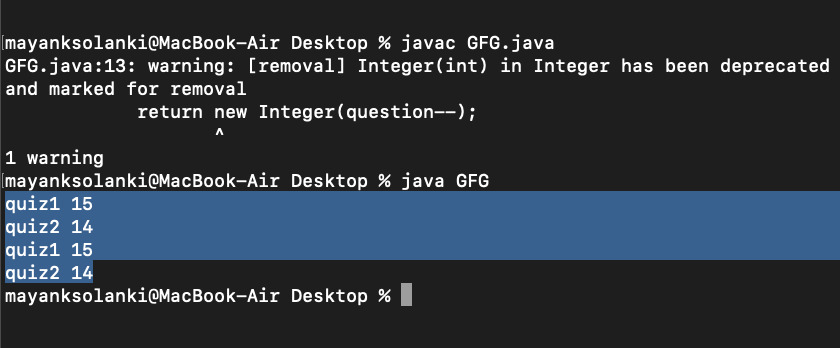該類提供線程局部變量。這些變量與其正常對應變量的不同之處在於,訪問一個變量(通過其 get 或 set 方法)的每個線程都有其自己的、獨立初始化的變量副本。本質上,這是除了編寫不可變類之外實現線程安全的另一種方法。由於對象不再共享,因此不需要同步,這可以提高應用程序的可擴展性和性能。 ThreadLocal提供線程限製,它是局部變量的擴展。 ThreadLocal僅在單個線程中可見。沒有兩個線程可以看到彼此的線程局部變量。這些變量通常是類中的私有靜態字段,並在線程內維護它們的狀態。
Note: ThreadLocal class extends Object class
構造函數:ThreadLocal():這將創建一個線程局部變量。
ThreadLocal類的方法
| 方法 | 執行的操作 |
|---|---|
| get() | 返回此線程局部變量的當前線程副本中的值。如果該變量對於當前線程沒有值,則首先將其初始化為調用 initialValue() 方法返回的值 |
| initialValue() | 返回本地線程變量的當前線程初始值。 |
| remove() | 刪除此線程局部變量的當前線程值。如果當前線程隨後讀取此線程局部變量,則將通過調用其 initialValue() 方法重新初始化其值,除非當前線程在此期間設置其值。這可能會導致當前線程中多次調用initialValue方法 |
| set() | 將此線程局部變量的當前線程副本設置為指定值。大多數子類不需要重寫此方法,僅依靠initialValue()方法來設置線程局部變量的值。 |
示例 1:
Java
// Java Program to Illustrate ThreadLocal Class
// Via get() and set() Method
// Class
// ThreadLocalDemo
class GFG {
// Main driver method
public static void main(String[] args)
{
// Creating objects of ThreadLocal class
ThreadLocal<Number> gfg_local
= new ThreadLocal<Number>();
ThreadLocal<String> gfg = new ThreadLocal<String>();
// Now setting custom value
gfg_local.set(100);
// Returns the current thread's value
System.out.println("value = " + gfg_local.get());
// Setting the value
gfg_local.set(90);
// Returns the current thread's value of
System.out.println("value = " + gfg_local.get());
// Setting the value
gfg_local.set(88.45);
// Returns the current thread's value of
System.out.println("value = " + gfg_local.get());
// Setting the value
gfg.set("GeeksforGeeks");
// Returning the current thread's value of
System.out.println("value = " + gfg.get());
}
}輸出
value = 100 value = 90 value = 88.45 value = GeeksforGeeks
示例 2:
Java
// Java Program to Illustrate ThreadLocal Class
// Via Illustrating remove() Method
// Class
// ThreadLocalDemo
public class GFG {
// Main driver method
public static void main(String[] args)
{
// Creating objects of ThreadLocal class
ThreadLocal<Number> gfg_local
= new ThreadLocal<Number>();
ThreadLocal<String> gfg = new ThreadLocal<String>();
// Setting the value
gfg_local.set(100);
// Returning the current thread's value
System.out.println("value = " + gfg_local.get());
// Setting the value
gfg_local.set(90);
// Returns the current thread's value of
System.out.println("value = " + gfg_local.get());
// Setting the value
gfg_local.set(88.45);
// Returning the current thread's value of
System.out.println("value = " + gfg_local.get());
// Setting the value
gfg.set("GeeksforGeeks");
// Returning the current thread's value of
System.out.println("value = " + gfg.get());
// Removing value using remove() method
gfg.remove();
// Returning the current thread's value of
System.out.println("value = " + gfg.get());
// Removing value
gfg_local.remove();
// Returns the current thread's value of
System.out.println("value = " + gfg_local.get());
}
}輸出
value = 100 value = 90 value = 88.45 value = GeeksforGeeks value = null value = null
示例 3:
Java
// Java Program to Illustrate ThreadLocal Class
// Via initialValue() Method
// Importing required classes
import java.lang.*;
// Class 1
// Helper class extending Thread class
class NewThread extends Thread {
private static ThreadLocal gfg = new ThreadLocal() {
protected Object initialValue()
{
return new Integer(question--);
}
};
private static int question = 15;
NewThread(String name)
{
// super keyword refers to parent class instance
super(name);
start();
}
// Method
// run() method for Thread
public void run()
{
for (int i = 0; i < 2; i++)
System.out.println(getName() + " " + gfg.get());
}
}
// Class 2
// Main class
// ThreadLocalDemo
public class GFG {
// Main driver method
public static void main(String[] args)
{
// Creating threads inside main() method
NewThread t1 = new NewThread("quiz1");
NewThread t2 = new NewThread("quiz2");
}
}輸出:

相關用法
- Java Java.lang.ThreadLocal.get()用法及代碼示例
- Java Java.lang.ThreadLocal.initialValue()用法及代碼示例
- Java Java.lang.ThreadLocal.remove()用法及代碼示例
- Java Java.lang.ThreadLocal.set()用法及代碼示例
- Java Java.lang.Thread.activeCount()用法及代碼示例
- Java Java.lang.Thread.checkAccess()用法及代碼示例
- Java Java.lang.Thread.currentThread()用法及代碼示例
- Java Java.lang.Thread.dumpStack()用法及代碼示例
- Java Java.lang.Thread.enumerate()用法及代碼示例
- Java Java.lang.Thread.getAllStackTraces()用法及代碼示例
- Java Java.lang.Thread.getContextClassLoader()用法及代碼示例
- Java Java.lang.Thread.getId()用法及代碼示例
- Java Java.lang.Thread.getName()用法及代碼示例
- Java Java.lang.Thread.getPriority()用法及代碼示例
- Java Java.lang.Thread.getStackTrace()用法及代碼示例
- Java Java.lang.Thread.getState()用法及代碼示例
- Java Java.lang.Thread.getThreadGroup()用法及代碼示例
- Java Java.lang.Thread.holdsLock()用法及代碼示例
- Java Java.lang.Thread.interrupt()用法及代碼示例
- Java Java.lang.Thread.interrupted()用法及代碼示例
- Java Java.lang.Thread.isAlive()用法及代碼示例
- Java Java.lang.Thread.isDaemon()用法及代碼示例
- Java Java.lang.Thread.isInterrupted()用法及代碼示例
- Java Java.lang.Thread.join()用法及代碼示例
- Java Java.lang.Thread.run()用法及代碼示例
注:本文由純淨天空篩選整理自佚名大神的英文原創作品 Java.lang.ThreadLocal Class in Java。非經特殊聲明,原始代碼版權歸原作者所有,本譯文未經允許或授權,請勿轉載或複製。
